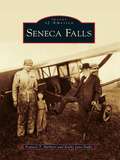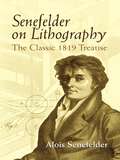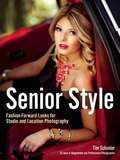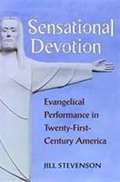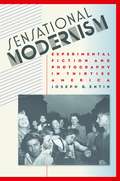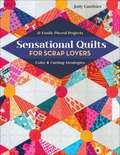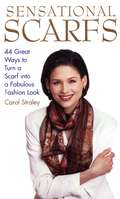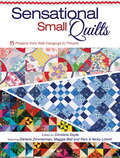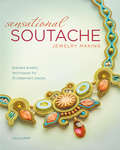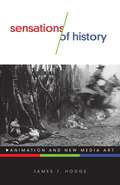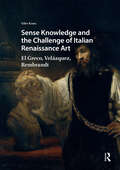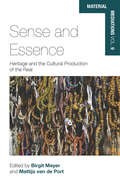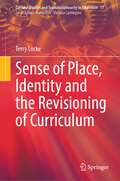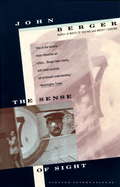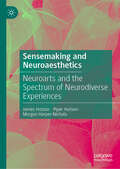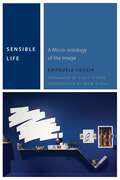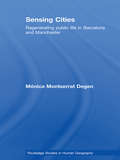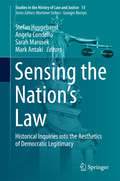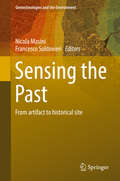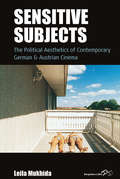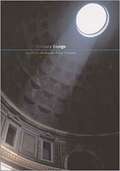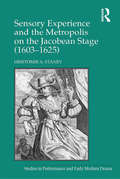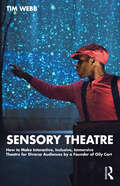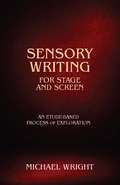- Table View
- List View
Seneca Falls
by Kathy Jans-Duffy Frances T. BarbieriA village located along the Seneca River, Seneca Falls was incorporated in 1831 and was soon linked to the Erie Canal by the Cayuga Seneca Canal. The women's suffrage movement was born in Seneca Falls when the first Women's Rights Convention, led by Elizabeth Cady Stanton, was held on July 19 and 20, 1848. Seneca County and Seneca Falls were also part of the Underground Railroad, and prominent citizens such as Ansel Bascom and Henry Seymour worked with freedom seekers in the decades before the Civil War. The town's knitting mills produced socks for the army during the war, second only to New York City in production. Many famous people also came to Seneca Falls to rally around the town's causes, among them are Lucretia Mott, Frederick Douglass, Garrett Smith, and Susan B. Anthony.
Senefelder on Lithography: The Classic 1819 Treatise
by Alois SenefelderThe invention in the late eighteenth century of lithography, or "writing on stone," reshaped the course of graphic arts. Some years later, the father of this world-changing technology, Alois Senefelder, published a description of the process. This English translation of the original German work, Vollständiges Lehrbuch der Steindruckerey, vividly describes Senefelder's struggles to develop and popularize the medium and the lithographic techniques employed in the process. The work is divided into two parts: the first presents a history of the invention and its different processes; the second provides practical instructions for its application--the varieties of stone, ink, instruments, paper, and presses used for different tasks, and the pitfalls to be avoided in working with these materials. An essential reference for graphic artists and students, the classic 1819 treatise remains the definitive work on this topic.
Senior Style
by Tim SchoolerTeens want portraits that speak to who they are-, images in which they look their best from head to toe. So, how does a photographer go about creating trendy, "now” photos with style and substance, capturing the essence of the student, while pleasing their parents too? Teen photography guru Tim Schooler paves the way to success as a teen photographer, showing you how to attract clients, build rapport, and plan for a session that pleases teens and parents. From there, he’ll present tips for location selection, incorporating props, and choosing flattering wardrobe options. You’ll also learn strategies for better lighting using natural light, studio lighting, and mixed lighting sources. Finally, you’ll learn how to enhance your portraits in postproduction, present your images, and close the sale. With myriad professional insights and 180 gorgeous images, readers will take away a new appreciation for the art and business of teen portrait photography.
Sensational Devotion: Evangelical Performance in Twenty-First-Century America
by Jill StevensonIn "Sensational Devotion, " Jill Stevenson examines a range of evangelical performances, including contemporary Passion plays, biblical theme parks, Holy Land re-creations, creationist museums, and megachurches, to understand how they serve their evangelical audiences while shaping larger cultural and national dialogues. Such performative media support specific theologies and core beliefs by creating sensual, live experiences for believers, but the accessible, familiar forms they take and the pop culture motifs they employ also attract nonbelievers willing to try out these genres, even if only for curiosity s sake. This familiarity not only helps these performances achieve their goals, but it also enables them to contribute to public dialogue about the role of religious faith in America. Stevenson shows how these genres are significant and influential cultural products that utilize sophisticated tactics in order to reach large audiences comprised of firm believers, extreme skeptics, and those in between. Using historical research coupled with personal visits to these various venues, the author not only critically examines these spaces and events within their specific religious, cultural, and national contexts, but also places them within a longer devotional tradition in order to suggest how they cultivate religious belief by generating vivid, sensual, affectively oriented, and individualized experiences. "
Sensational Modernism
by Joseph B. EntinChallenging the conventional wisdom that the 1930s were dominated by literary and photographic realism, Sensational Modernism uncovers a rich vein of experimental work by politically progressive artists. Examining images by photographers such as Weegee and Aaron Siskind and fiction by writers such as William Carlos Williams, Richard Wright, Tillie Olsen, and Pietro di Donato, Joseph Entin argues that these artists drew attention to the country's most vulnerable residents by using what he calls an "aesthetic of astonishment," focused on startling, graphic images of pain, injury, and prejudice. Traditional portrayals of the poor depicted stoic, passive figures of sentimental suffering or degraded but potentially threatening figures in need of supervision. Sensational modernists sought to shock middle-class audiences into new ways of seeing the nation's impoverished and outcast populations. The striking images these artists created, often taking the form of contorted or disfigured bodies drawn from the realm of the tabloids, pulp magazines, and cinema, represented a bold, experimental form of social aesthetics. Entin argues that these artists created a willfully unorthodox brand of vernacular modernism in which formal avant-garde innovations were used to delineate the conditions, contradictions, and pressures of life on the nation's fringes.
Sensational Quilts for Scrap Lovers: 11 Easily Pieced Projects; Color & Cutting Strategies
by Judy GauthierDiscover new possibilities for your fabric stash with this guide featuring 11 easy scrap quilts using ingenious, no-waste cutting techniques!Quilter Judy Gauthier is a master of turning fabric scraps into fabulous quilts. In this practical guide, sheshares her secrets for conquering that mountain of odds and ends. Learn how to piece gorgeous scrap quilts from fabric prints you never thought would go together—even remnants in odd shapes and sizes. Judy’s easy-to-use templates and color theory tips will have you cutting up your scrap surplus and making magic in no time. With these fun and inspiring projects, playing with scraps may become your all-time favorite sport.
Sensational Scarfs: 44 Great Ways to Turn a Scarf into a Fabulous Fashion Look
by Carol StraleySimple, illustrated instructions for 44 ways to wear scarfs. 120 black-and-white photographs.From the Trade Paperback edition.
Sensational Small Quilts
by Christine DoyleSmall Quilts with Big Appeal!There's a little something for every quilter in Sensational Small Quilts! Break out of the box by tackling modern quilts, attack your stash with beautiful scrap creations, and embrace your heritage with traditional blocks. Novice and experienced quilters alike will enjoy expanding their repertoire by pushing themselves to try new methods in these little quilts.Inside, you'll find: • 15 quilt projects in an array of styles and colors, in sizes ranging from wallhangings to throws. • Colorful step-by-step illustrations and diagrams that make assembly easy to understand and accomplish. • A detailed techniques section explains how to achieve beautiful results in all of your quilted projects. • Projects, tips and methods from authors you know and trust, including Kay Capps Cross, Darlene Zimmerman, Maggie Ball, and Pam and Nicky Lintott.With Sensational Small Quilts, you'll love the freedom to experiment and explore your creative side. And don't forget-the size may be small, but the results will be sensational!
Sensational Soutache Jewelry Making: Braided Jewelry Techniques for 15 Statement Pieces
by Csilla PappLuxurious and stylish braided jewelry!Eye-catching, ornate and fashionable, jewelry created with soutache braid can be made easily!In Sensational Soutache Jewelry Making, you'll learn the basic techniques of soutache embroidery, and then get creative with 15 easy-to-follow projects for bracelets, earrings, brooches, rings and necklaces. Get inspired by author Csilla Papp's ideas, then use your imagination to put your own twists on projects like the simple but stunning Zima Earrings and Baroque Bracelet, or a challenging statement piece like the India Choker. Color and stone choice combine with elaborate braids to make these pieces distinctly yours.Add an elaborate element to your jewelry work with Sensational Soutache Jewelry Making.
Sensations of History: Animation and New Media Art (Electronic Mediations #57)
by James J. HodgeA phenomenological investigation into new media artwork and its relationship to history What does it mean to live in an era of emerging digital technologies? Are computers really as antihistorical as they often seem? Drawing on phenomenology&’s investigation of time and history, Sensations of History uses encounters with new media art to inject more life into these questions, making profound contributions to our understanding of the digital age in the larger scope of history.Sensations of History combines close textual analysis of experimental new media artworks with in-depth discussions of key texts from the philosophical tradition of phenomenology. Through this inquiry, author James J. Hodge argues for the immense significance of new media art in examining just what historical experience means in a digital age. His beautiful, aphoristic style demystifies complex theories and ideas, making perplexing issues feel both graspable and intimate.Highlighting underappreciated, vibrant work in the fields of digital art and video, Sensations of History explores artists like Paul Chan, Phil Solomon, John F. Simon, and Barbara Lattanzi. Hodge&’s provocative interpretations, which bring these artists into dialogue with well-known works, are perfect for scholars of cinema, media studies, art history, and literary studies. Ultimately, Sensations of History presents the compelling case that we are not witnessing the end of history—we are instead seeing its rejuvenation in a surprising variety of new media art.
Sense Knowledge and the Challenge of Italian Renaissance Art: El Greco, Velázquez, Rembrandt (Visual and Material Culture, 1300-1700)
by Giles KnoxGiles Knox examines how El Greco, Velaìzquez, and Rembrandt, though a disparate group of artists, were connected by a new self-consciousness with respect to artistic tradition. In particular, Knox considers the relationship of these artists to the art of Renaissance Italy, and sets aside nationalist art histories in order to see the period as one of fruitful exchange. Across Europe during the seventeenth century, artists read Italian-inspired writings on art and these texts informed how they contemplated their practice. Knox demonstrates how these three artists engaged dynamically with these writings, incorporating or rejecting the theoretical premises to which they were exposed. Additionally, this study significantly expands our understanding of how paintings can activate the sense of touch. Knox discusses how Velaìzquez and Rembrandt, though in quite different ways, sought to conjure for viewers thoughts about touching that resonated directly with the subject matter they depicted.
Sense and Essence: Heritage and the Cultural Production of the Real (Material Mediations: People and Things in a World of Movement #9)
by Birgit Meyer Mattijs van de PortContrary to popular perceptions, cultural heritage is not given, but constantly in the making: a construction subject to dynamic processes of (re)inventing culture within particular social formations and bound to particular forms of mediation. Yet the appeal of cultural heritage often rests on its denial of being a fabrication, its promise to provide an essential ground to social-cultural identities. Taking this paradoxical feature as a point of departure, and anchoring the discussion to two heuristic concepts—the "politics of authentication" and "aesthetics of persuasion"—the chapters herein explore how this tension is central to the dynamics of heritage formation worldwide.
Sense of Place, Identity and the Revisioning of Curriculum (Cultural Studies and Transdisciplinarity in Education #17)
by Terry LockeThis book explores intersections between sense of place, the formation of identity, indigeneity and colonisation, literature and literary study, the arts, and a revisioned school curriculum for the Anthropocene. Underpinning the book is a conviction that sense of place is central to the fostering of the change of heart required to secure the survival of human life on earth. It offers a coherent overview of seemingly disparate realities on a geographically and historically sprawling canvas. The book is a work of literary non-fiction, drawing on a range of sources: literary works and criticism, theoretical research, empirical studies and artworks. Of its very nature, the book enacts an extensive cultural critique. After establishing a cross-disciplinary foundation for “sense of place”, the book describes its relationship to identity with reference to such terms as attachment, dispossession, reclamation and representation. It shows how a hopeful narrative for planet stewardship can be developed by the uptake of indigenous and traditional discourses of place. It concludes with the envisioning of a place-conscious curriculum, and ways in which an activist agenda might be pursued in the Anthropocene.
Sense of Sight
by John BergerWith this provocative and infinitely moving collection of essays, a preeminent critic of our time responds to the profound questions posed by the visual world. For when John Berger writes about Cubism, he writes not only of Braque, Léger, Picasso, and Gris, but of that incredible moment early in this century when the world converged around a marvelouis sense of promise. When he looks at the Modigiliani, he sees a man's infinite love revealed in the elongated lines of the painted figure. Ranging from the Renaissance to the conflagration of Hiroshima; from the Bosphorus to Manhattan; from the woodcarvers of a French village to Goya, Dürer, and Van Gogh; and from private experiences of love and of loss to the major political upheavals of our time, The Sense of Sight encourages us to see with the same breadth, courage, and moral engagement that its author does.
Sensemaking and Neuroaesthetics: Neuroarts and the Spectrum of Neurodiverse Experiences
by James Hutson Piper Hutson Morgan Harper-NicholsThis book investigates the complex interrelationships between neuroscience, arts, technical design, and the spectrum of neurodivergent conditions, introducing the emerging topic of neuroarts. It emphasizes the power of art and technologies as a multisensory tool for helping neurodivergent individuals discover their sensory preferences, and for neurotypical individuals to broaden their understanding of the world by simulating different sensory experiences. Drawing on the enactivism theory, which posits that cognitive processes are inherently shaped through the dynamic interplay between an organism and its environmental context, the authors discuss the applications of emerging technologies and propose a new theory to discuss and identify ‘neurotribes’ based on their relation to sense making or the body.A timely and well-needed resource for scholars in the fields of neuroaesthetics and neurodiversity, as well as art therapists, clinical psychologists, and medical practitioners specializing in neurodiversity and sensory perception disorders, this book can also serve cultural institutions developing inclusive experiences for a neurodiverse public, and professionals in the tech industry focusing on AI, augmented reality, and sensory technology.
Sensible Life: A Micro-ontology of the Image (Commonalities)
by Emanuele CocciaWe like to imagine ourselves as rational beings who think and speak, yet to live means first and foremost to look, taste, feel, or smell the world around us. But sensibility is not just a faculty: We are sensible objects both to ourselves and to others, and our life is through and through a sensible life.This book, now translated into five languages, rehabilitates sensible existence from its marginalization at the hands of modern philosophy, theology, and politics. Coccia begins by defining the ontological status of images. Not just an internal modification of our consciousness, an image has an intermediate ontological status that differs from that of objects or subjects. The book’s second part explores our interactions with images in dream, fashion, and biological facts like growth and generation. Our life, Coccia argues, is the life of images.
Sensing Cities: Regenerating Public Life in Barcelona and Manchester (Routledge Studies in Human Geography #14)
by Monica DegenAs cities globally re-design their urban landscapes, they produce a different urban aesthetic and create new experiential milieus. Urban regeneration processes generate radical physical, social and cultural changes in neighbourhoods that demand new conceptual frameworks to address their impact upon daily urban life. Sensing Cities investigates the reconfiguration of contemporary public space and life through the prism of the senses. The book explores how the increased stylization of cityscapes requires an understanding of public life as a spatial-sensuous encounter. Degen examines how power relations in public spaces are embedded in, exercised and resisted through the sensuous geography of place. This sensory paradigm is then applied to compare two emblematic regeneration projects, namely el Raval in Barcelona and Castlefield in Manchester. By combining detailed ethnographic analysis and interviews with those involved in planning regeneration processes and those experiencing them, the book argues that a changing sensuous landscape is crucial in redefining people’s social practices, attachments and experiences in places. Focusing on two European cities at the forefront of urban design, Barcelona and Manchester, Degen draws on sociology, geography, anthropology, cultural and architectural studies to provide a critical account of the politics of publicness in the entrepreneurial city. With numerous photographs and maps this book stresses the ongoing, embodied and active nature of regeneration as a lived social process rather than merely a physical or economic exercise. Ultimately, Sensing Cities examines how urban regeneration is made effective through the organisation of sensory experience. This book is essential reading for students and researchers of Architecture, Urban Studies and Human Geography.
Sensing the Nation's Law: Historical Inquiries Into The Aesthetics Of Democratic Legitimacy (Studies In The History Of Law And Justice #13)
by Stefan Huygebaert Angela Condello Sarah Marusek Mark AntakiThis book examines how the nation – and its (fundamental) law – are ‘sensed’ by way of various aesthetic forms from the age of revolution up until our age of contested democratic legitimacy. Contemporary democratic legitimacy is tied, among other things, to consent, to representation, to the identity of ruler and ruled, and, of course, to legality and the legal forms through which democracy is structured. This book expands the ways in which we can understand and appreciate democratic legitimacy. If (democratic) communities are “imagined” this book suggests that their “rightfulness” must be “sensed” – analogously to the need for justice not only to be done, but to be seen to be done. This book brings together legal, historical and philosophical perspectives on the representation and iconography of the nation in the European, North American and Australian contexts from contributors in law, political science, history, art history and philosophy.
Sensing the Past
by Nicola Masini Francesco SoldovieriThis book provides a complete overview of novel and state of art sensing technologies and geotechnologies relevant to support management and conservation of CH sites, monuments and works of art. The book is organized in an introduction stating the motivations and presenting the overall content of the volume and four parts. The first part focuses on remote sensing and geophysics for the study of human past and cultural heritage at site scale and as element of the surrounding territory. The second part presents an overview of non invasive technologies for investigating monuments and works of art. The third part presents the new opportunities of ICT for an improved and safe cultural heritage fruition, from the virtual and augmented reality of historical context to artifact tracking. Finally, the forth part presents a significant worldwide set of success cases of the exploitation of the integration of geotechnologies in archeology and architectural heritage management. This book is of interest to researchers, experts of heritage science, archaeologists, students, conservators and other professionals of cultural heritage.
Sensitive Subjects: The Political Aesthetics of Contemporary German and Austrian Cinema (Film Europa #23)
by Leila MukhidaBoth politically and aesthetically, the contemporary German and Austrian film landscape is a far cry from the early days of the medium, when critics like Siegfried Kracauer produced foundational works of film theory amid the tumult of the early twentieth century. Yet, as Leila Mukhida demonstrates in this innovative study, the writings of figures like Kracauer and Walter Benjamin in fact remain an undervalued tool for understanding political cinema today. Through illuminating explorations of Michael Haneke, Valeska Grisebach, Andreas Dresen, and other filmmakers of the post-reunification era, Mukhida develops an analysis centered on film aesthetics and experience, showing how medium-specific devices like lighting, sound, and mise-en-scène can help to cultivate political sensitivity in spectators.
Sensory Affect, Learning Spaces, and Design Education: Strategies for Reflective Teaching and Student Engagement in Higher Education
by Lorraine MarshalseyThrough the lens of sensory affect, this book offers a new way of thinking about day-to-day teaching and student engagement within learning spaces in design education. The book examines the definitions, concepts, ideas and overlaps of a repertoire of learning spaces prevalent in higher education and addresses the pedagogical gap that exists between broader learning structures and spaces, and the requirements of specialist design education. Recognising that mainstream teaching environments impact upon design studio learning and student engagement, the book positions creative learning spaces at the heart of practice-based learning. It defines the underlying pedagogical philosophy of a creative learning space in design education and reports on how practical strategies incorporating sensory affect may be implemented by educators to foster better student engagement in these spaces within higher education. Bringing much-needed attention to specialist design teaching and learning spaces in higher education, this book will be of interest to educators, researchers and post graduate students immersed in design education, pedagogy, and learning spaces more broadly.
Sensory Design
by Frank VodvarkaWhat if we designed for all of our senses? Suppose for a moment that sound, touch, and odor were treated as the equals of sight, and emotion considered as important as cognition. What would our built environment be like if sensory response, sentiment, and memory were critical design factors, the equals of structure and program? <p><p> In Sensory Design, Joy Monice Malnar and Frank Vodvarka explore the nature of our responses to spatial constructs—from various sorts of buildings to gardens and outdoor spaces, to constructions of fantasy. To the degree that this response can be calculated, it can serve as a typology for the design of significant spaces, one that would sharply contrast with the Cartesian model that dominates architecture today. <p><p> In developing this typology, the authors consult the environmental sciences, anthropology, psychology, and architectural theory, as well as the spatial analysis found in literary depiction. Finally, they examine the opportunities that CAVE™ and other immersive virtual reality technologies present in furthering a new, sensory-oriented design paradigm. The result is a new philosophy of design that both celebrates our sensuous occupation of the built environment and creates more humane design. <p><p> Joy Monice Malnar, AIA, is associate professor of architecture at the University of Illinois, Urbana-Champaign. Frank Vodvarka is associate professor of fine arts at Loyola University Chicago. They are coauthors of The Interior Dimension: A Theoretical Approach to Enclosed Space (1992).
Sensory Experience and the Metropolis on the Jacobean Stage (Studies In Performance And Early Modern Drama Ser.)
by Hristomir A. StanevAt the turn of the seventeenth century, Hristomir Stanev argues, ideas about the senses became part of a dramatic and literary tradition in England, concerned with the impact of metropolitan culture. Drawing upon an archive of early modern dramatic and prose writings, and on recent interdisciplinary studies of sensory perception, Stanev here investigates representations of the five senses in Jacobean plays in relationship to metropolitan environments. He traces the significance of under-examined concerns about urban life that emerge in micro-histories of performance and engage the (in)voluntary and sometimes pre-rational participation of the five senses. With a dominant focus on sensation, he argues further for drama’s particular place in expanding the field of social perception around otherwise less tractable urban phenomena, such as suburban formation, environmental and noise pollution, epidemic disease, and the impact of built-in city space. The study focuses on ideas about the senses on stage but also, to the extent possible, explores surviving accounts of the sensory nature of playhouses. The chapters progress from the lower order of the senses (taste and smell) to the higher (hearing and vision) before considering the anomalous sense of touch in Platonic terms. The plays considered include five city comedies, a romance, and two historical tragedies; playwrights whose work is covered include Shakespeare, Jonson, Webster, Fletcher, Dekker, and Middleton. Ultimately, Stanev highlights the instrumental role of sensory flux and instability in recognizing the uneasy manner in which the London writers, and perhaps many of their contemporaries, approached the rapidly evolving metropolitan environment during the reign of King James I.
Sensory Theatre: How to Make Interactive, Inclusive, Immersive Theatre for Diverse Audiences by a Founder of Oily Cart
by Tim WebbSensory Theatre: How to Make Interactive, Inclusive, Immersive Theatre for Diverse Audiences by a Founder of Oily Cart is an accessible step-by-step guide to creating theatre for inclusive audiences, such as young people on the autism spectrum or affected by other neuro-divergent conditions and children under two. Conventional theatre relies on seeing and hearing to involve its audience; sensory theatre harnesses the power of five or more senses to address its participants who have different ways of relating to the world around them. This book is an insightful history of Oily Cart and its pioneering development of work for the very young, including Baby Theatre, and for neuro-divergent audiences including those on the autism spectrum. It gives a clear introduction to the fundamental concepts of this theatre, suggests a host of practical techniques drawn from over forty years of experience, and describes some of Oily Cart’s most radical innovations, including theatre on trampolines, in hydrotherapy pools, and with flying audiences in the company of aerial artists. The book also includes copious photos from the Oily Cart’s archives and links to videos examples of the company’s work. Readers will learn how to: Research the intended audience while not being led astray by labels. Create a welcoming, immersive sensory space in classrooms, nurseries, school halls, and playgrounds. Devise sensory stories that can be adapted to suit different audiences. Recruit, audition, cast, and run rehearsals. Ensure that the production is truly sensory and interactive. Written for Theatre for Young Audiences, Drama in Education, and specialized Applied Theatre courses, as well as educators and theatre practitioners interested in creating inclusive, interactive productions, Sensory Theatre offers a goldmine of ideas for making work that connects with audiences who can be the hardest to reach.
Sensory Writing for Stage and Screen: An Etude-Based Process of Exploration
by Michael WrightThrough a series of systematic explorations across a wide range of scenarios, Sensory Writing for Stage and Screen offers script writers exercises for attending to their own sensory experiences as a means to exploring the sensory experiences—and worlds—of the characters they create.
